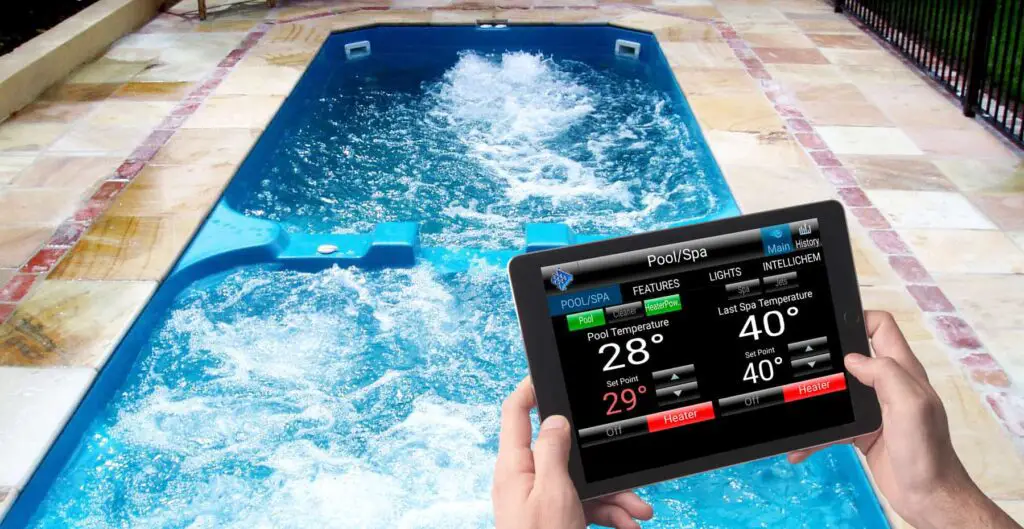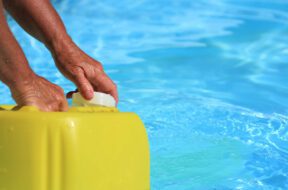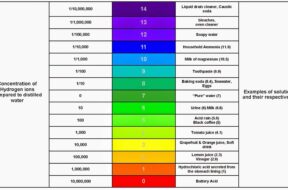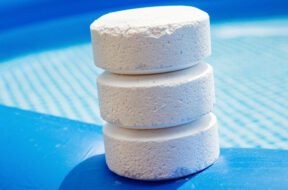
Want to learn more about algaecide? Read on to find out when to add algaecide to your pool maintenance routine and other helpful tips.
As technology advances, people’s lives seem to get easier. Advancements make tasks that were once difficult very manageable. These difficult jobs are now done by us with a press of a button. These advancements are no different when it comes to pool care. Many companies have made huge strides in one-touch panels and mobile apps to keep your pool clean and healthy.
Now all of your daily pool settings can be found in one place, saving you precious personal time. Today we are going to be diving into those systems. This means going to detail some products that may be worth the investment and discuss all of the benefits you’ll reap by investing in this modern technology.

For more information on modern pool technology:
-Learn about solar pool covers
-The new technology with UV pool sanitation
-Advancements with robotic pool cleaners
-Click here to learn about LED pool lights
Something that has become a mainstay in pools today is a “one-touch” panel. This is a way to automate and control your pool in a simple manner. These panels can be added to any pool, new or existing, and make your life significantly easier. These panels allow you to control your pool’s pump, light, spa, and many other things. This also allows you to set a temperature, so your pool is exactly where you want it to be. These systems also usually come with a remote control, so you can control them from all over your house.
Many companies have ventured into the panel production business. Pentair, Zodiac and Hayward are three of the most popular brands on the market currently. These systems are beneficial because of their convenience, easy- to-use nature, and energy efficiency. The system keeps your pool where you need it and automates your pool’s tools to work only as hard as they need to.
Most automation panels now have mobile apps to accompany them. These are often included in the initial cost for the system and perform most of the same features as the physical panel. This mobile app is synced to your entire automation system and offers a remote control in your pocket. This is incredibly convenient for many reasons. For instance, you can start heating your pool or spa when you are not even home. This means that after a long day of work or after a date you can come home to a perfectly heated pool.
This can also be convenient when you are on vacation, or away from the house. Settings can be adjusted and automated on your phone to clean your pool while you are away. This means that you won’t have to deal with the pains of removing algae or balancing your pool all over again due to a vacation. These cleaning settings can also be applied when you are in town, limiting the amount of physical work you need to perform on your pool.
Think of pool automation systems as a pool computer. The computer works to communicate information from your panel, through wires, and into your different pool systems. For instance, if you would like your pool to be warmer, your computer would translate that change to the pool’s heater. This is done virtually, and actually requires an internet connection to work properly.
Automated pool systems are now available in wireless and/or wired connections. Wireless automation systems are a new technology that actually connects to your home WIFI. This connection allows your pool system and the panel to communicate, and share commands that you automate or manually suggest.
Like many aspects of technology, pool automated systems are not cheap. These systems start at a few hundred dollars, and often reach costs of a couple thousand. This means that not every consumer will be able to afford them. However, there are clear benefits to the hefty price tag. Like previously stated, the convenience and simplicity of these systems are a huge bonus. Also, if used properly these systems will save you money on heating and electric costs. Below are a couple models of these automated systems, and the price range they are currently going at (as of June 2019):
Overall, I see the need for these systems as a case-by-case opinion. Many people will find great use out of pool automation systems. They are convenient, easy to use, and offer many additional benefits. However, the cost is pretty steep. Many people spend thousands of dollars already building and maintaining their pool. The additional price tag will be hard to sell people on, but their existence is a convenience factor. This technological advancement is one that will make your pool experience significantly better, but it is not a necessity.

Want to learn more about algaecide? Read on to find out when to add algaecide to your pool maintenance routine and other helpful tips.

In this quick guide, we’ll answer the question “can you over shock a pool” and unveil the factors to consider when shocking a pool.

Maintaining both pH and total alkalinity in your swimming pool is important for keeping your pool properly sanitized and non-corrosive. Total alkalinity is to pH what cyanuric acid is to free chlorine. Total alkalinity stabilizes pH levels. The ideal pool pH level is 7.4 to 7.6. The ideal total alkalinity level is 80 to 120 ppm.

The Association of Pool and Spa Professionals recommends free chlorine levels for both swimming pools and hot tubs be kept between 2.0 and 4.0 ppm. However, the Center for Disease Control recommends free chlorine stay above 1 ppm in pools and 3 ppm in hot tubs.